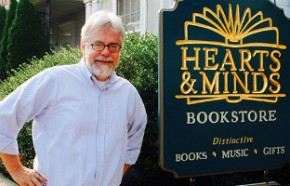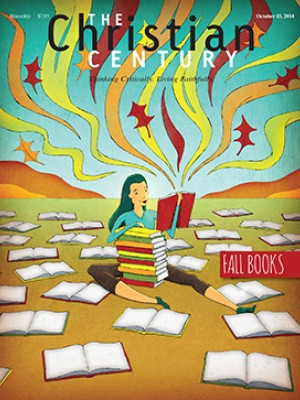One store, many churches: Bookseller Byron Borger

With his wife, Beth, Byron Borger co-owns Hearts and Minds, an independent Christian bookstore in Dallastown, Pennsylvania, and writes a blog for the store’s website. The store seeks to foster “a uniquely Christian worldview where Christ’s Lordship is honored and lived out in relevant ways in the midst of our highly secularized, postmodern culture.”
Why did you and your wife start a religious bookstore?
In the late 1970s Beth and I worked for a campus ministry organization called the Coalition for Christian Outreach, which was based in a Presbyterian church near Pittsburgh. That congregation and the CCO both emphasized a wide-as-life vision of redemption, relating faith to all areas of life. This meant we read a lot of books with students across the curriculum, relating theology to technology, medicine, business, whatever. We realized that the students who told us that we ought to have a bookstore were right. We loved books and loved suggesting resources. With a naive love of books and belief in their power, we opened our shop in 1982.
Read our latest issue or browse back issues.
You live in the same building where your store is. How does that work out?
We chose that arrangement so we could be equally involved in the business and more easily present to our children when they were young. It hasn’t been easy, but it has been wonderful having such easy access to the store day or night.
What’s most satisfying about running an independent religious bookstore? What is most challenging?
We continue to enjoy the interaction with customers and introducing people to new—and often old as well—authors. It is an honor to help pastors and church leaders think through reading programs for their own development and for their parishes. We love helping book clubs, church libraries, Bible study groups, Sunday school classes. We are aware every day how this calling demands of us a huge ecumenicity, a willingness to serve a variety of folks, and the tenacity to continue to promote books.
The business challenges are almost insurmountable, with fewer readers—and people wanting books as cheap as possible, as if the bottom line is all that matters. If I see another post about sustainability and Wendell Berry with a link to buy books on localism from Amazon, I’ll pull my hair out.
What does a bookstore do now that it might not have done ten or 15 years ago?
Most obvious has been the shift to online bookselling, writing a blog, doing the social media stuff, spreading the word (and getting orders) via Twitter and Facebook. Our mail-order work accounts for about a third of our business, and we find that the Internet has allowed us to publish book reviews, engage customers, and create a great tribe of fans and friends. The amount of information, though, online and elsewhere, is nearly overwhelming. In this sense, it is harder to catch the attention of potential readers. We have to make and remake the case that reading is a fundamental spiritual practice and that books are tools that can serve our Christian discipleship.
How would you describe your customers?
We stock books from all the mainline denominational publishers, but we probably have more customers who identify with evangelicalism than not. That younger evangelical pastors and certainly evangelical laypeople read more than older mainline ones seems pretty evident.
We are honored to have fairly complex conversations with folks wanting to dig deep into thoughtful Christian literature but who haven’t read much theology or other religious scholarship at all. Our customers are often people reading James K. A. Smith, say, or attending the Q conferences or who are fans of Timothy Keller.
What keeps people coming back?
I suspect they like the attention we try to offer, not only to the details of our orders but to the conversations we have on books and authors. Much of it comes down to relationships. People hunger for community. Finding booksellers who want to be an influence, who want to be a friend, creates a bit of a tribe.
Do people walk in the door thinking you represent one kind of Christian and maybe walk out when they don’t see their own views or politics represented?
The bigotry on both sides is demoralizing. My sense is that it is worse on the left, with progressives refusing to read even thoughtful evangelicals. I suppose some highbrow liturgical types don’t like our simple Amish novels, and I suppose some evangelicals are perplexed by our Catholic stuff. But it isn’t as bad as it used to be, and we see signs of greater willingness to read outside of one’s own favored tradition. The younger mainline clergy are sometimes themselves rather evangelical, or robust moderates with pretty orthodox views, not like, say, the Bishop Spong or Jesus Seminar views that characterize many older liberals. And of course many younger Christians are evangelical on core doctrines and progressive on most social issues.
Is it the rare sort of place where evangelicals and liberals actually meet each other and interact as Christians?
I know that a few folks of differing perspectives have become friends because they’ve met in our shop. I know that some people have agreed to read “across party lines” because of our recommendations, which they’ve come to trust.
So what books would you recommend?
I think my favorite book these days is Steven Garber’s Visions of Vocation: Common Grace for the Common Good, beautifully published by InterVarsity Press. Our bookstore is mentioned in his eloquent first book, The Fabric of Faithfulness: Weaving Together Belief and Behavior.
I’m a big fan of the books on spirituality by Ruth Haley Barton of the Transforming Center. She has a new one on communal spiritual practices.
I cannot recommend enough the feisty books by Brian Walsh, a campus minister at the University of Toronto who runs a morning Eucharist called Wine Before Breakfast. Colossians Remixed: Subverting the Empire (cowritten with his wife, New Testament scholar Sylvia Keesmaat) is one of the most stimulating books I’ve ever read. I love the contemplative writer Robert Benson, a lay Benedictine who writes about spiritual formation, but also has books about caring for his backyard, baseball, Eucharist, finding one’s vocation.
I love the upbeat and often very funny lines of Margot Starbuck; she has written five books, and I can’t wait for another. Zondervan’s best-selling author Ann Voskamp has a new devotional using the Jesse Tree.
Have you heard of the forthcoming The Book of Strange New Things, by Michel Faber? Amazingly, it is about a missionary effort on other planets, and the faith crisis of the missionary’s beloved spouse who is left on Earth, which is slowly becoming unraveled. I don’t know if the author sees himself as a person of faith, but it is highly anticipated as an important literary novel.
My all-time favorite writer that few have heard of is Calvin Seerveld, a Dutch Calvinist professor of aesthetics who studied with Barth. He has translated Psalms and writes hymns alongside his stunning work in the arts. A six-volume set of his occasional academic papers, essays, and sermons was recently released by Dordt College Press.





